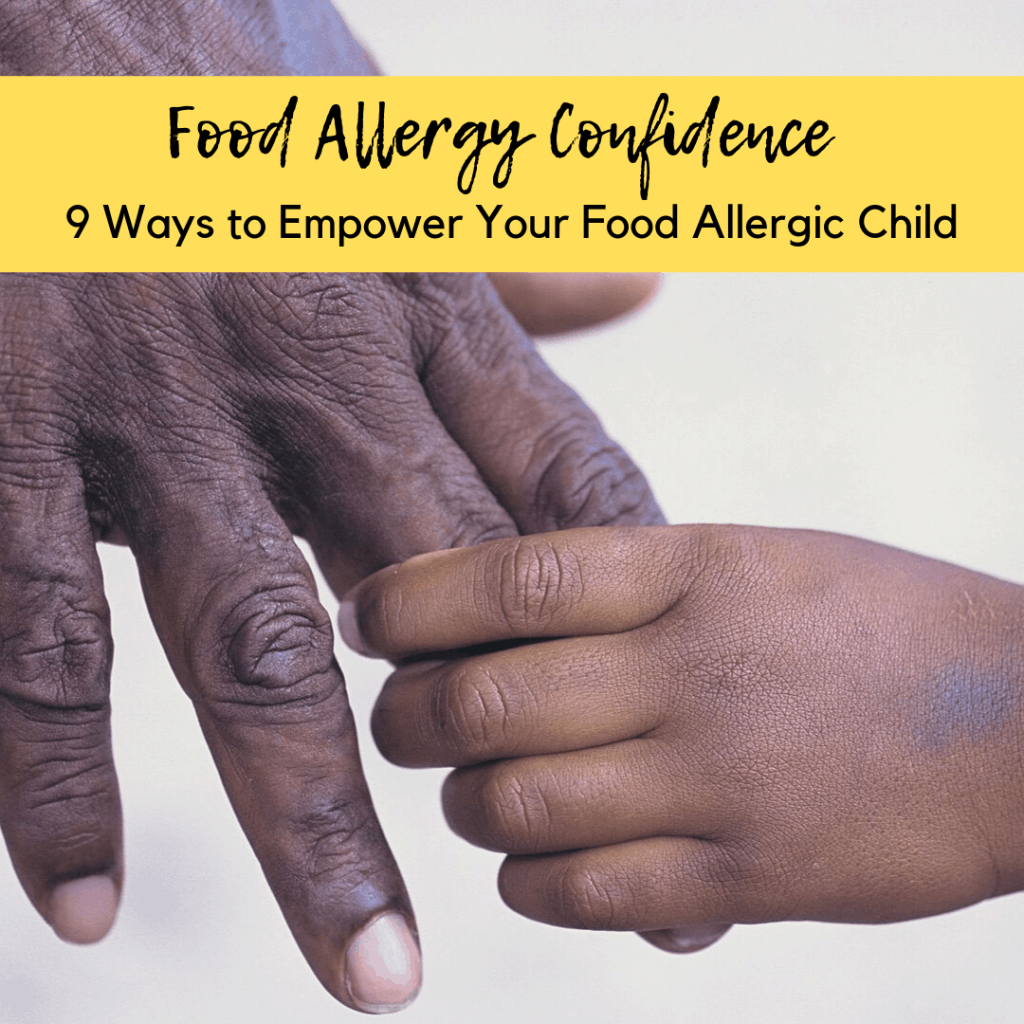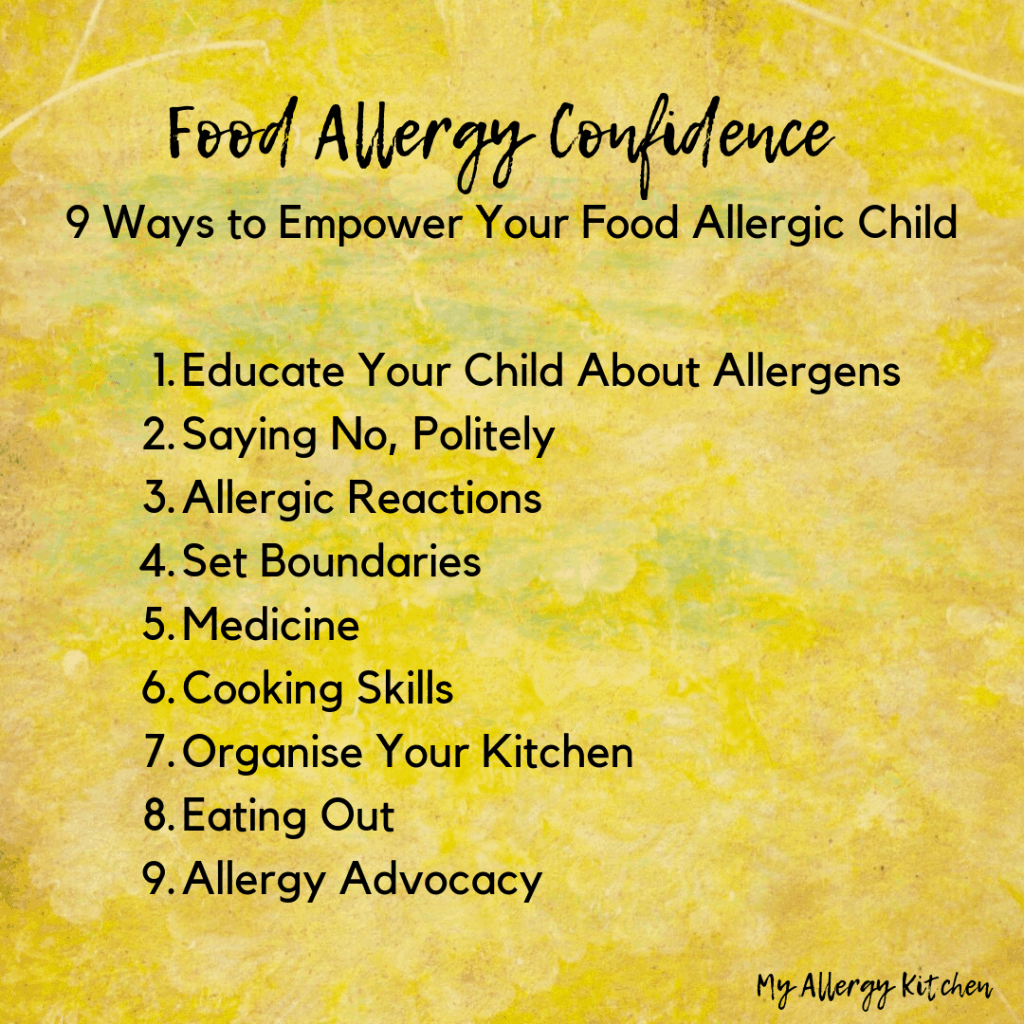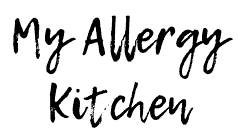Children with food allergies have to rely on other people to keep them safe from their allergens. This is fine when they are tiny and you are with them all the time. But as they get older it can make them vulnerable. Although food allergy awareness is getting better, not everyone has a good understanding of food allergies. And even those who do can forget or make mistakes. As a result, for food allergy confidence, you need to empower your child to speak up for themselves and understand their own needs.

Developing Food Allergy Confidence
In the long run, the ultimate goal is for your child to manage their allergies independently, without relying on you. Of course, this is a gradual process, but it’s good to be aware of it from a young age. The earlier you start teaching your child about their food allergy, the more confidence they will feel. Today I want to share with you some steps you can take at different ages and stages to help your child feel confident about living with food allergies.
Ideally, you want your child to feel that all of these extra steps we do to prevent an allergic reaction are just what we do. They are a part of the daily routine, just like brushing teeth. If it becomes their norm, they can keep themselves safe without consciously thinking about it. We don’t wait until they start going out by themselves to teach children how to cross the road safely. It’s the same principle with food allergies.

Educate Your Child About Allergens
For your child to have confidence about managing their food allergy, they firstly need to know exactly which foods they cannot eat. With a young child you can tell them the proper names of the foods they need to avoid and show them what they look like. For example, if they are allergic to cow's milk, make sure you refer to their milk alternative drink as 'coconut milk' or 'oat milk'. This will also help them to ask for exactly what they need. As they get older, you can teach them to read the names of the foods they react to and show them how to read food labels.
Saying No, Politely
If your child knows what they are allergic to, this empowers them to say a clear ‘no’ to foods they know are unsafe. This gives them more independence and control as a result, and makes them less reliant on you. Added bonus: the more they can practice this from a young age, the more it becomes a habit. As children get older, the more they want to fit in with their friends, and saying ‘no’ to certain foods needs to feel normal to them. They also need to know how to say no politely, and you can work with them to develop a 'script' they can use in different situations.
From a young age I have told my daughter she isn't allowed to eat certain foods because they make her feel poorly. We didn’t have a big, serious chat about it, but just had lots of small conversations over the years as it came up. This obviously sunk in, because back when she was at at preschool, one day the teacher was talking about breakfast with the group. The teacher suggested that eggs were a healthy breakfast. My little girl piped up and told everyone “I’m not allowed eggs because I’m allergic”! This makes me feel more confident that when I am not with her, she will speak up for herself.
Allergic Reactions
You also need to teach your child about the signs of an allergic reaction and how to ask for help. This is particularly important if they have immediate and/or severe reactions. This is not an easy conversation to have, and you need to find the right balance. While you need to give them this knowledge, you don't want to make them feel scared or anxious. However, it's essential to talk about this. If they can recognise when they are having a reaction, they can ask for help faster. Young children might understand things like:
- Your mouth might feel tingly or fizzy
- Your breath might feel tight
- You might get a tummy ache
- Your skin might feel itchy
- If you feel any of these you must tell a grown up straight away so we can help you feel better.
Set Boundaries
All children need clear boundaries. For a child with food allergies, you must set non-negotiable rules around food, in the same way you would teach your child not to talk to strangers or hit other children. These boundaries will change over time as your child gradually takes on more responsibility for managing their own allergies.
For a young child you might have the rule: always check with mummy or daddy before accepting food from someone else.
With an older child, you could teach them: never share food with others at nursery/preschool/school.
When they become a teenager the rule might develop into: always read the label before eating something, even if you’ve eaten it before.
Other rules might include:
- If you’re not sure about a food, always say no
- Always carry ephinephrine atuo-injector/inhaler/antihistamines/baby wipes (as needed for your child) - more on medicines below.
Medicine
If your child needs emergency medication such as epinephrine, antihistamines or an inhaler, they must bring these with them wherever they go. For a very young child this is obviously up to the parents to remember. Many people like to make up an ‘allergy kit’ in a small toiletries bag or pencil case, which can be easily slipped into a larger bag. This might also include baby wipes for wiping hands or surfaces. When you go out, talk about how you always check you have your allergy kit before you leave. Just casually mention it: "Shoes on, coat on, allergy kit, ready to go!" Make it part of your leaving the house routine.
When they get a bit older, you can start to get them to check their own bag before they leave the house (with your supervision). It’s the same principle as making them responsible for remembering their own homework. The exact age you start to do this depends on the individual child and their level of maturity. As they grow up, you can gradually make your child responsible for carrying their own medication. Then this becomes a habit they can continue for life.
Cooking Skills
Being able to cook is an essential life skill for everyone. It’s even more important when you suffer with food allergies and can’t always rely on convenience food or takeaways. This is why your child needs to learn to cook from scratch. Get them helping you in the kitchen from a young age. Even a toddler can help with making rice crispie cakes or scrubbing potatoes.
Give them opportunities to develop their cooking skills and learn how to cook with alternative ingredients from the start. Alternatively, if you’re not confident in the kitchen yourself, you can learn together from cookbooks or by watching videos. In addition, you can also teach them about how to avoid cross contamination. For example, show them how we use a different knife for the dairy free butter, and we make the dairy free sandwiches first, and wrap them up before making everyone else’s.
Organise Your Kitchen
The way you organise your kitchen can make a huge difference in your child’s level of independence and confidence. For instance, if they have to ask you every single time they want something to eat, they are completely reliant on you. This puts them in a vulnerable position. And it’s also a burden on you if you’re having to wait on them hand and foot!
There are different ways to overcome this. For example, you may have a ‘safe shelf’ within your child’s reach. You pre-check all the foods on this shelf, so that only foods that are safe for your child will be on this shelf. Alternatively, you can buy coloured stickers to put on food packets. You could use a green dot for safe foods and a red dot for unsafe foods. Or have child-friendly stickers with characters that your child loves and stick them on all their safe foods. Giving them control over this small aspect of their life can help boost their confidence.
Eating Out
If your child has food allergies it can be tempting to avoid certain situations like eating out in restaurants. However, unless you expect your child to avoid restaurants for their entire life, this is not a great idea! Going out for a meal can actually be a great opportunity for you to teach your child that it is ok to eat out in restaurants - as long as they take certain steps and ask the right questions. Take your child to restaurants and role model how to ask questions. Show them what an allergen menu looks like. Over time, get them to start asking questions for themselves.
Allergy Advocacy
For older children, awareness raising activities can help boost your child’s self-esteem. Your child may enjoy educating others about food allergies. This could be part of a school project, or a club or activity they do outside of school such as scouts or guides. Or they might like to participate in a fundraising event for an allergy charity such as a sponsored walk, cake sale, quiz night, car wash etc.
Obviously, we hope that our children will grow out of their allergies, and most will. In the meantime, we can empower our children to have as much confidence about food allergy as appropriate. And if they don’t outgrow their allergy? Taking these steps means they will be well prepared for managing their own allergies as teenagers and eventually into adulthood.
Check out my book, The Busy Parent's Guide to Food Allergies, for more advice and guidance on parenting a child with food allergies.
How do you talk to your child about their food allergies? How do you promote food allergy confidence and independence?


[…] child need a book about food allergies? Well firstly, sharing a book together can be a great way to teach your child about food allergies. It can help them to understand why they mustn't eat certain foods. Secondly, reading a book about […]